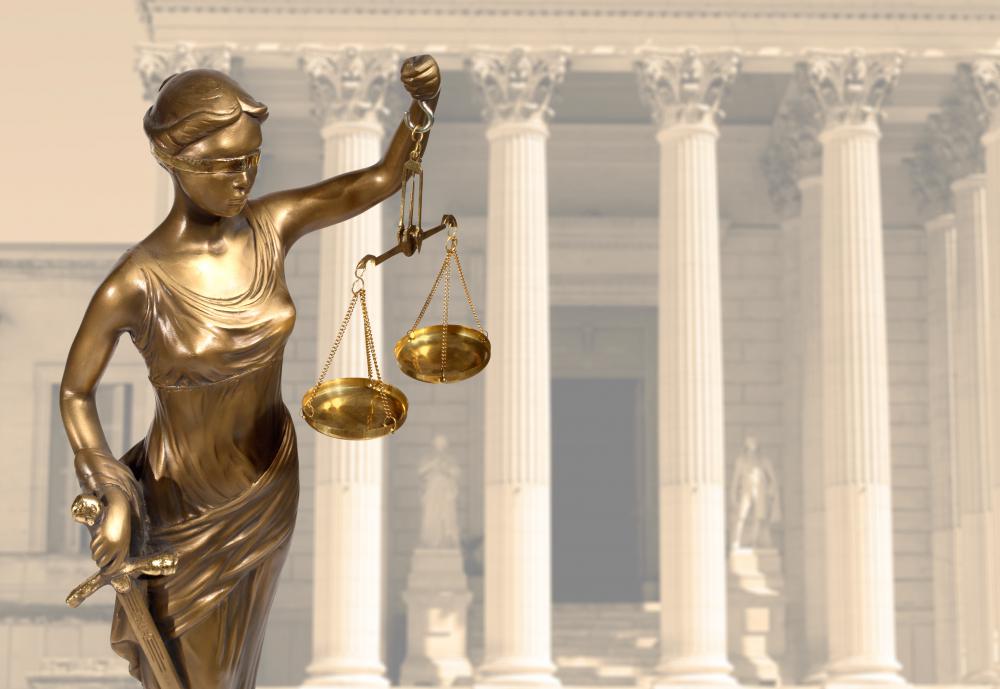At WiseGEEK, we're committed to delivering accurate, trustworthy information. Our expert-authored content is rigorously fact-checked and sourced from credible authorities. Discover how we uphold the highest standards in providing you with reliable knowledge.
What is Copyright Infringement Law?
According to the World Intellectual Property Organization (WIPO), human creations, often referred to as intellectual property, are generally divided into two categories. One of those categories, which includes intellectual property such as novels, musical works, and artistic performance, is known as copyright. Infringement can be defined as an intrusion or violation of something. Copyright infringement law refers to regulations regarding the intrusions and violations of the rights pertaining to copyright creations.
When a person creates something such as an arrangement of words, shapes, or movements, certain entitlements also tend to come into existence. Those entitlements may belong to the creator or they may belong to another entity. For example, a document may be written by Tyler Jones but his employer, EEE Corporation, may own the copyright. If anyone other than EEE Corporation attempts to use that document in an unauthorized manner, EEE Corporation can seek justice by using copyright infringement law.

According to WIPO, the main entitlement of the possessor of a copyright is generally the ability to execute, authorize, or prohibit reproductions of the protected work, explaining the tendency for such entitlements to be referred to as copyrights. Laws pertaining to copyright can, however, do more than prohibit people from making unauthorized reproductions of another person’s intellectual works. These laws can also prohibit people from altering someone’s work. Plagiarism, which generally involves using part or all of someone’s work without acknowledging the creator, can also be dealt with by these laws.
Many people falsely believe that when copyright infringement laws exist, they only protect officially copyrighted work. When a work is officially copyrighted, a person or business has engaged in a legal process to register a copyright with the proper authorities. WIPO says that in most countries a work is protected the moment it is created. When this is the case, owners of intellectual property can seek protection of infringement laws even if their work is not registered.
Although the automatic creation and equal protection of both registered and unregistered copyrights is common, copyright infringement law is not consistent throughout the world. One reason for this is because the level of importance placed on creating and enforcing such law is not consistent. In some countries, intellectual property rights receive little attention. Another reason that copyright infringement law is not consistent worldwide is because different societies can have very different views regarding the rights that should be accorded for certain types of work.
AS FEATURED ON:
AS FEATURED ON:











Discussion Comments
I have always wondered exactly what needs to be done to obtain permission. From reading the other comments it seems to me that someone who holds an artistic copyright on a logo only needs to give their permission, but what about major corporations or small companies? Do you need to obtain the company's permission as well as the artist's permission?
@titans62 It seems to me that it is a rather simple thing to obtain permission to use someone else's copyright but in the end it comes down to whether they choose to let someone borrow it.
It may be hard to do so, and it may not happen at all but in the United States it seems very easy for someone to violate copyright laws and find themselves in a potential lawsuit.
@jmc88 - I had a similar instance happen at my school, only I was the one that tried using legal means to do so.
You can use someone's copyright if you obtain their permission. I contacted the person who created the logo and requested if I could use it to create shirts and raise money for a certain charitable cause. They refused and that was the end of that. However, two years later I saw someone use the exact same logo that I was going to use, without the persons permission, and this shirt turned out to be quite popular and catch the attention of the person that held the copyright. He claimed copyright and threatened to sue the students if the school did not take care of it, which they did and the students faced harsh penalties.
I went to a small college in Illinois and prior to every football game we had against our rivals once a year there would be people that would create shirts with our schools logo and sell them across campus for a major profit. After the school learned how much money was being made off of these (I heard one story of a student making over four grand off of using the college logo) the school stepped in and claimed copyright infringement on the shirts and banned them from the games.
Usually these shirts included sayings that were derogatory towards our rival school and they were more concerned with stopping this. By claiming copyright infringement they were able to stop people from profiting off of using the schools image and end the yearly illegal trend.
Post your comments